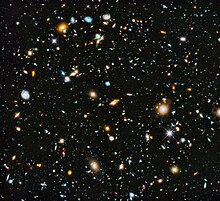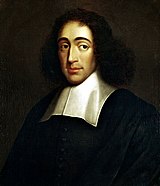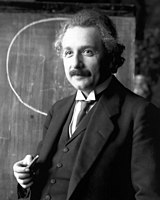
A | B | C | D | E | F | G | H | CH | I | J | K | L | M | N | O | P | Q | R | S | T | U | V | W | X | Y | Z | 0 | 1 | 2 | 3 | 4 | 5 | 6 | 7 | 8 | 9
Pantheism is the philosophical religious belief that reality, the universe, and nature are identical to divinity or a supreme entity.[1] The physical universe is thus understood as an immanent deity, still expanding and creating, which has existed since the beginning of time.[2] The term pantheist designates one who holds both that everything constitutes a unity and that this unity is divine, consisting of an all-encompassing, manifested god or goddess.[3][4] All astronomical objects are thence viewed as parts of a sole deity.
The worship of all gods of every religion is another definition, but it is more precisely termed omnism.[5] Pantheist belief does not recognize a distinct personal god,[6] anthropomorphic or otherwise, but instead characterizes a broad range of doctrines differing in forms of relationships between reality and divinity.[7] Pantheistic concepts date back thousands of years, and pantheistic elements have been identified in various religious traditions. The term pantheism was coined by mathematician Joseph Raphson in 1697[8][9] and since then, it has been used to describe the beliefs of a variety of people and organizations.
Pantheism was popularized in Western culture as a theology and philosophy based on the work of the 17th-century philosopher Baruch Spinoza, in particular, his book Ethics.[10] A pantheistic stance was also taken in the 16th century by philosopher and cosmologist Giordano Bruno.[11]
In the East, Advaita Vedanta, a school of Hindu philosophy is thought to be similar to pantheism in Western philosophy. The early Taoism of Laozi and Zhuangzi is also sometimes considered pantheistic, although it could be more similar to panentheism. Cheondoism, which arose in the Joseon Dynasty of Korea, and Won Buddhism are also considered pantheistic.
Etymology
Pantheism derives from the Greek word πᾶν pan (meaning "all, of everything") and θεός theos (meaning "god, divine"). The first known combination of these roots appears in Latin, in Joseph Raphson's 1697 book De Spatio Reali seu Ente Infinito,[9] where he refers to "pantheismus".[8] It was subsequently translated into English as "pantheism" in 1702.
Definitions

| Part of a series on |
| Spirituality |
|---|
| Outline |
| Influences |
| Research |
| Part of a series on |
| Irreligion |
|---|
| Part of a series on |
| Theism |
|---|
There are numerous definitions of pantheism. Some consider it a theological and philosophical position concerning God.[14]: p.8
A doctrine which identifies God with the universe, or regards the universe as a manifestation of God.
Pantheism is the view that everything is part of an all-encompassing, immanent God. All forms of reality may then be considered either modes of that Being, or identical with it.[15] Some hold that pantheism is a non-religious philosophical position. To them, pantheism is the view that the Universe (in the sense of the totality of all existence) and God are identical.[16]
History
Pre-modern times
Early traces of pantheist thought can be found within animistic beliefs and tribal religions throughout the world as an expression of unity with the divine, specifically in beliefs that have no central polytheist or monotheist personas. Hellenistic theology makes early recorded reference to pantheism within the ancient Greek religion of Orphism, where pan (the all) is made cognate with the creator God Phanes (symbolizing the universe),[17] and with Zeus, after the swallowing of Phanes.[18]
Pantheistic tendencies existed in a number of Gnostic groups, with pantheistic thought appearing throughout the Middle Ages.[19] These included the beliefs of mystics such as Ortlieb of Strasbourg, David of Dinant, Amalric of Bena, and Eckhart.[19]: pp. 620–621
The Catholic Church has long regarded pantheistic ideas as heresy.[20][21] Sebastian Franck was considered an early Pantheist.[22] Giordano Bruno, an Italian friar who evangelized about a transcendent and infinite God, was burned at the stake in 1600 by the Roman Inquisition. He has since become known as a celebrated pantheist and martyr of science.[23][24]
The Hindu philosophy of Advaita Vedanta is thought to be similar to pantheism. The term Advaita (literally "non-secondness", but usually rendered as "nondualism",[25][26] and often equated with monism[note 1] ) refers to the idea that Brahman alone is ultimately real, while the transient phenomenal world is an illusory appearance (maya) of Brahman. In this view, jivatman, the experiencing self, is ultimately non-different ("na aparah") from Ātman-Brahman, the highest Self or Reality.[27][28][29][note 2]
The jivatman or individual self is a mere reflection or limitation of singular Ātman in a multitude of apparent individual bodies.[30]
Baruch Spinoza

In the West, pantheism was formalized as a separate theology and philosophy based on the work of the 17th-century philosopher Baruch Spinoza.[14]: p.7 Spinoza was a Dutch philosopher of Portuguese descent raised in the Sephardi Jewish community in Amsterdam.[32] He developed highly controversial ideas regarding the authenticity of the Hebrew Bible and the nature of the Divine, and was effectively excluded from Jewish society at age 23, when the local synagogue issued a herem against him.[33] A number of his books were published posthumously, and shortly thereafter included in the Catholic Church's Index of Forbidden Books.[34]
In the posthumous Ethics, he opposed René Descartes' famous mind–body dualism, the theory that the body and spirit are separate.[35] Spinoza held the monist view that the two are the same, and monism is a fundamental part of his philosophy. He was described as a "God-intoxicated man," and used the word God to describe the unity of all substance.[35] This view influenced philosophers such as Georg Wilhelm Friedrich Hegel, who said, "You are either a Spinozist or not a philosopher at all."[36] Spinoza earned praise as one of the great rationalists of 17th-century philosophy[37] and one of Western philosophy's most important thinkers.[38] Although the term "pantheism" was not coined until after his death, he is regarded as the most celebrated advocate of the concept.[39] Ethics was the major source from which Western pantheism spread.[10]
18th century
The first known use of the term "pantheism" was in Latin ("pantheismus"[8]) by the English mathematician Joseph Raphson in his work De Spatio Reali seu Ente Infinito, published in 1697.[9] Raphson begins with a distinction between atheistic "panhylists" (from the Greek roots pan, "all", and hyle, "matter"), who believe everything is matter, and Spinozan "pantheists" who believe in "a certain universal substance, material as well as intelligence, that fashions all things that exist out of its own essence."[40][41] Raphson thought that the universe was immeasurable in respect to a human's capacity of understanding, and believed that humans would never be able to comprehend it.[42] He referred to the pantheism of the Ancient Egyptians, Persians, Syrians, Assyrians, Greek, Indians, and Jewish Kabbalists, specifically referring to Spinoza.[43]
The term was first used in English by a translation of Raphson's work in 1702. It was later used and popularized by Irish writer John Toland in his work of 1705 Socinianism Truly Stated, by a pantheist.[44][19]: pp. 617–618 Toland was influenced by both Spinoza and Bruno, and had read Joseph Raphson's De Spatio Reali, referring to it as "the ingenious Mr. Ralphson's (sic) Book of Real Space".[45] Like Raphson, he used the terms "pantheist" and "Spinozist" interchangeably.[46] In 1720 he wrote the Pantheisticon: or The Form of Celebrating the Socratic-Society in Latin, envisioning a pantheist society that believed, "All things in the world are one, and one is all in all things ... what is all in all things is God, eternal and immense, neither born nor ever to perish."[47][48] He clarified his idea of pantheism in a letter to Gottfried Leibniz in 1710 when he referred to "the pantheistic opinion of those who believe in no other eternal being but the universe".[19][49][50][51]
In the mid-eighteenth century, the English theologian Daniel Waterland defined pantheism this way: "It supposes God and nature, or God and the whole universe, to be one and the same substance—one universal being; insomuch that men's souls are only modifications of the divine substance."[19][52] In the early nineteenth century, the German theologian Julius Wegscheider defined pantheism as the belief that God and the world established by God are one and the same.[19][53]
Between 1785–89, a controversy about Spinoza's philosophy arose between the German philosophers Friedrich Heinrich Jacobi (a critic) and Moses Mendelssohn (a defender). Known in German as the Pantheismusstreit (pantheism controversy), it helped spread pantheism to many German thinkers.[54]
19th century
Growing influence
During the beginning of the 19th century, pantheism was the viewpoint of many leading writers and philosophers, attracting figures such as William Wordsworth and Samuel Coleridge in Britain; Johann Gottlieb Fichte, Schelling and Hegel in Germany; Knut Hamsun in Norway; and Walt Whitman, Ralph Waldo Emerson and Henry David Thoreau in the United States. Seen as a growing threat by the Vatican, in 1864 it was formally condemned by Pope Pius IX in the Syllabus of Errors.[55]
A letter written in 1886 by William Herndon, Abraham Lincoln's law partner, was sold at auction for US$30,000 in 2011.[56] In it, Herndon writes of the U.S. President's evolving religious views, which included pantheism.
"Mr. Lincoln's religion is too well known to me to allow of even a shadow of a doubt; he is or was a Theist and a Rationalist, denying all extraordinary – supernatural inspiration or revelation. At one time in his life, to say the least, he was an elevated Pantheist, doubting the immortality of the soul as the Christian world understands that term. He believed that the soul lost its identity and was immortal as a force. Subsequent to this he rose to the belief of a God, and this is all the change he ever underwent."[56][57]
The subject is understandably controversial, but the content of the letter is consistent with Lincoln's fairly lukewarm approach to organized religion.[57]
Comparison with non-Christian religions
Some 19th-century theologians thought that various pre-Christian religions and philosophies were pantheistic. They thought Pantheism was similar to the ancient Hinduism[19]: pp. 618 philosophy of Advaita (non-dualism).[58]
19th-century European theologians also considered Ancient Egyptian religion to contain pantheistic elements and pointed to Egyptian philosophy as a source of Greek Pantheism.[19]: pp. 618–620 The latter included some of the Presocratics, such as Heraclitus and Anaximander.[59] The Stoics were pantheists, beginning with Zeno of Citium and culminating in the emperor-philosopher Marcus Aurelius. During the pre-Christian Roman Empire, Stoicism was one of the three dominant schools of philosophy, along with Epicureanism and Neoplatonism.[60][61] The early Taoism of Laozi and Zhuangzi is also sometimes considered pantheistic, although it could be more similar to Panentheism.[49]
Cheondoism, which arose in the Joseon Dynasty of Korea, and Won Buddhism are also considered pantheistic. The Realist Society of Canada believes that the consciousness of the self-aware universe is reality, which is an alternative view of Pantheism.[62]
20th century
In the late 20th century, some declared that pantheism was an underlying theology of Neopaganism,[63] and pantheists began forming organizations devoted specifically to pantheism and treating it as a separate religion.[49]

21st century

Dorion Sagan, son of scientist and science communicator Carl Sagan, published the 2007 book Dazzle Gradually: Reflections on the Nature of Nature, co-written with his mother Lynn Margulis. In the chapter "Truth of My Father", Sagan writes that his "father believed in the God of Spinoza and Einstein, God not behind nature, but as nature, equivalent to it."[64]
In 2009, pantheism was mentioned in a Papal encyclical[65] and in a statement on New Year's Day, 2010,[66] criticizing pantheism for denying the superiority of humans over nature and seeing the source of man's salvation in nature.[65]
In 2015, The Paradise Project, an organization "dedicated to celebrating and spreading awareness about pantheism," commissioned Los Angeles muralist Levi Ponce to paint the 75-foot mural in Venice, California near the organization's offices.[67] The mural depicts Albert Einstein, Alan Watts, Baruch Spinoza, Terence McKenna, Carl Jung, Carl Sagan, Emily Dickinson, Nikola Tesla, Friedrich Nietzsche, Ralph Waldo Emerson, W.E.B. Du Bois, Henry David Thoreau, Elizabeth Cady Stanton, Rumi, Adi Shankara, and Laozi.[68][69]
Categorizations
There are multiple varieties of pantheism[19][70]: 3 and various systems of classifying them relying upon one or more spectra or in discrete categories.
Degree of determinism
The philosopher Charles Hartshorne used the term Classical Pantheism to describe the deterministic philosophies of Baruch Spinoza, the Stoics, and other like-minded figures.[71] Pantheism (All-is-God) is often associated with monism (All-is-One) and some have suggested that it logically implies determinism (All-is-Now).[35][72][73][74][75] Albert Einstein explained theological determinism by stating,[76] "the past, present, and future are an 'illusion'". This form of pantheism has been referred to as "extreme monism", in which – in the words of one commentator – "God decides or determines everything, including our supposed decisions."[77] Other examples of determinism-inclined pantheisms include those of Ralph Waldo Emerson,[78] and Hegel.[79]
However, some have argued against treating every meaning of "unity" as an aspect of pantheism,[80] and there exist versions of pantheism that regard determinism as an inaccurate or incomplete view of nature. Examples include the beliefs of John Scotus Eriugena,[81] Friedrich Wilhelm Joseph Schelling and William James.[82]
Degree of belief
It may also be possible to distinguish two types of pantheism, one being more religious and the other being more philosophical. The Columbia Encyclopedia writes of the distinction:
- "If the pantheist starts with the belief that the one great reality, eternal and infinite, is God, he sees everything finite and temporal as but some part of God. There is nothing separate or distinct from God, for God is the universe. If, on the other hand, the conception taken as the foundation of the system is that the great inclusive unity is the world itself, or the universe, God is swallowed up in that unity, which may be designated nature."[83]
Form of monism

Philosophers and theologians have often suggested that pantheism implies monism.[84] [note 3]
Other
In 1896, J. H. Worman, a theologian, identified seven categories of pantheism: Mechanical or materialistic (God the mechanical unity of existence); Ontological (fundamental unity, Spinoza); Dynamic; Psychical (God is the soul of the world); Ethical (God is the universal moral order, Fichte); Logical (Hegel); and Pure (absorption of God into nature, which Worman equates with atheism).[19]
In 1984, Paul D. Feinberg, professor of biblical and systematic theology at Trinity Evangelical Divinity School, also identified seven: Hylozoistic; Immanentistic; Absolutistic monistic; Relativistic monistic; Acosmic; Identity of opposites; and Neoplatonic or emanationistic.[90]
Demographics
Prevalence
According to censuses of 2011, the UK was the country with the most Pantheists.[91] As of 2011, about 1,000 Canadians identified their religion as "Pantheist", representing 0.003% of the population.[92] By 2021, the number of Canadian pantheists had risen to 1,855 (0.005%).[93] In Ireland, Pantheism rose from 202 in 1991,[94] to 1106 in 2002,[94] to 1,691 in 2006,[95] 1,940 in 2011.[96][needs update] In New Zealand, there was exactly one pantheist man in 1901.[97] By 1906, the number of pantheists in New Zealand had septupled to 7 (6 male, 1 female).[98] This number had further risen to 366 by 2006.[99]
